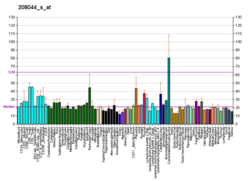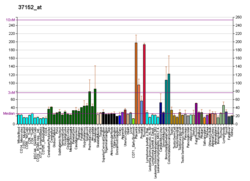Peroxisome proliferator-activated receptor delta (PPAR-delta), or (PPAR-beta), also known as Nuclear hormone receptor 1 (NUC1) is a nuclear receptor that in humans is encoded by the PPARD gene.[5]
This gene encodes a member of the peroxisome proliferator-activated receptor (PPAR) family. It was first identified in Xenopus in 1993.[6]
- ^ a b c GRCh38: Ensembl release 89: ENSG00000112033 – Ensembl, May 2017
- ^ a b c GRCm38: Ensembl release 89: ENSMUSG00000002250 – Ensembl, May 2017
- ^ "Human PubMed Reference:". National Center for Biotechnology Information, U.S. National Library of Medicine.
- ^ "Mouse PubMed Reference:". National Center for Biotechnology Information, U.S. National Library of Medicine.
- ^ Schmidt A, Endo N, Rutledge SJ, Vogel R, Shinar D, Rodan GA (October 1992). "Identification of a new member of the steroid hormone receptor superfamily that is activated by a peroxisome proliferator and fatty acids". Molecular Endocrinology. 6 (10): 1634–1641. doi:10.1210/mend.6.10.1333051. PMID 1333051. S2CID 23506853.
- ^ Krey G, Keller H, Mahfoudi A, Medin J, Ozato K, Dreyer C, et al. (December 1993). "Xenopus peroxisome proliferator activated receptors: genomic organization, response element recognition, heterodimer formation with retinoid X receptor and activation by fatty acids". The Journal of Steroid Biochemistry and Molecular Biology. 47 (1–6): 65–73. doi:10.1016/0960-0760(93)90058-5. PMID 8274443. S2CID 25098754.






